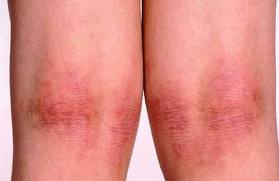Dermatologists have seen more than a threefold increase of eczema in the last thirty years. The condition is common especially in childhood. Skin irritants can play a role. Dr. Harvey Lui, Professor for Dermatology at the University of British Columbia in Vancouver, Canada, also observed, that eczema is much more common in the Asian population. Patients who came from the warmer climate of Southeast Asia and are exposed to a harsher, colder climate will get into trouble more easily, as dryness of the skin will aggravate the skin condition.
Dr. Lui also stresses, that patient education about sensible skin care is of great importance. Fighting fire with fire – like taking a hot shower to combat itchy and dry skin- will make things worse in the long run. Inflamed skin needs to be kept cool. Dr. Lui also stresses that skin has to be kept from drying out. These simple measures for which no prescription is needed are often neglected.
In severe cases the traditional steroid cream has been replaced by preparations, which have an effect on the immune response. Dr. Lui explains that eczema is partially an exaggerated response of the immune system to whatever is noxious or irritating in the environment. The medication tacrolimus (Prograf) is a naturally derived compound that makes the immune cells (T-cells) less active, as they are responsible for the overactive response. It is called an “immunomodulator”.
Due to this knowledge more treatment options are available than in the past. Atopic eczema is very often combined with asthma and allergies and tends to run in families. As the immune system gets strengthened during childhood, eczema tends to be worse in the young person, and time can be the greatest ally in the healing process.
More info on skin rashes: http://nethealthbook.com/dermatology-skin-disease/skin-rash/
Reference: 1. The Medical Post, March 2, 2004 (p.2 and 65) 2. “Guidelines of care for atopic dermatitis”
Hanifin J – J Am Acad Dermatol – 2004 Mar; 50(3), p.391
Last edited Oct. 26, 2014






